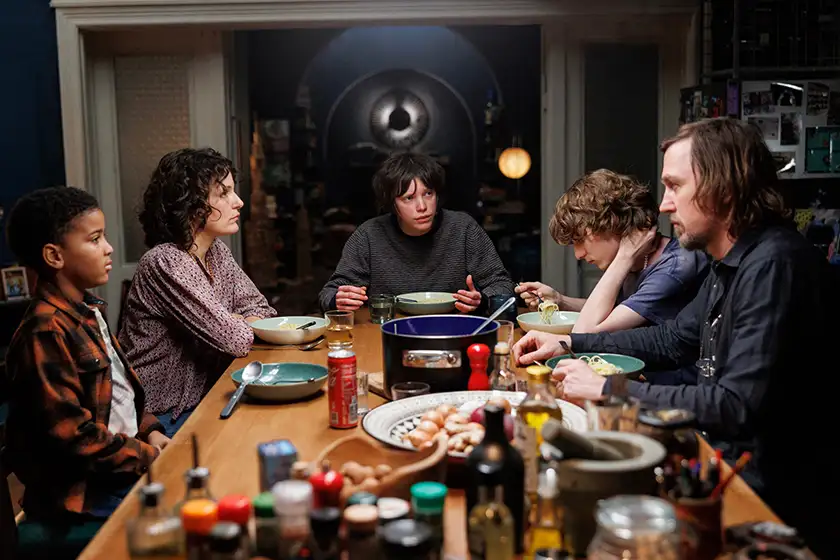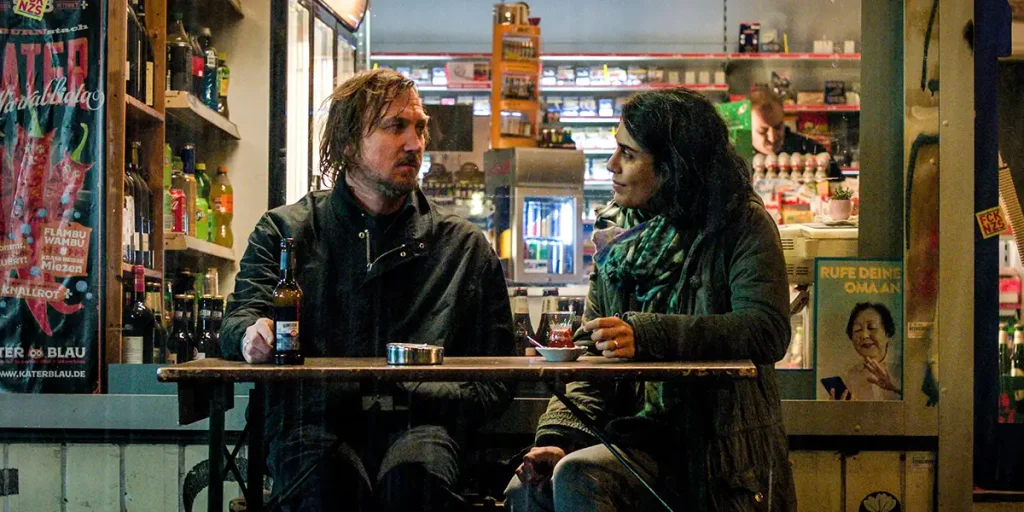Tom Tykwer’s The Light (Das Licht), which opened the 2025 Berlin Film Festival, wastes its intriguing premise by turning it into a means to convey a simplistic socio-political message.
Writer & Director: Tom Tykwer
Genre: Drama
Run Time: 162′
Berlin Film Festival Screening: February 13, 2025
U.S. Release Date: TBA
U.K. Release Date: TBA
The Light (Das Licht) is a puzzling movie. On one hand, it features fantastic performances from the entire cast and a couple of superbly shot and choreographed scenes that, alone, are worth the entire film. On the other hand, it’s a complete mess of themes and tones from start to end, whose plot developments range from stylistically awkward to nearly incomprehensible, with a politically charged final twist that feels lazy at best, and manipulative at worst.
At first, the opening movie of the 2025 Berlin Film Festival, from writer-director Tom Tykwer (Cloud Atlas), feels promising enough. Two women sit in a room, wondering if it’s true that some souls are wondering the Earth because they haven’t realized that they’ve died yet. “You have to be able to mirror yourself, to let go,” says one of them, explaining that most of these souls are really just looking for a “companion”. “But what does that mean?,” her friend asks. “That we’re never really alone.” Even though we do get a glimpse of the titular “light” – a device, invented by a neurologist, whose flashing lights send biosignals to the brain that alter one’s perception of reality, as if they were on drugs – the film soon moves to a completely different setting and then proceeds to introduce its many Berlin-based characters.
And so, we meet Maja (Agnieszka Salamon), Polish housekeeper for a family whose 17-year-old son Jon (Julius Gause) spends his entire time playing a VR game locked in his messy room, beautifully introduced to us with a high-angle wide shot that will definitely make you giggle. Then we have Tim (Lars Eidinger, of White Noise), a businessman in his forties who’s growing increasingly frustrated by his colleagues’ disinterest in his ideas and his wife’s apparent loss of desire.
A teenage girl named Frieda (newcomer Elke Biesendorfer) enjoys clubbing with her activist friends; when we first meet them, they are doing acid at a club. Milena (Nicolette Krebitz), who’s in her forties, is struggling to get funding for a theatre she plans to build in a Kenyan slum. Her travels are further complicated by the man with which she had an affair (Mudar Ramadan, of Ghost Trail), with whom she shares custody of their 8-year-old son Dio (Elyas Eldridge), unexpectedly leaving for Namibia halfway through the film.

Needless to say, there’s something that connects all of these characters, and even though you’ll have to wait till you’re an hour into the movie to start to understand what’s going on, the scene that reveals it is hysterically funny and highly rewarding. Not long later, the central family in The Light – husband and wife Tim and Milena, who are parents to twins Frieda and Jon – are in need of a new housekeeper, and that’s when Syrian immigrant Farrah – the same woman who was wondering about lost souls in the opening scene – enters the picture.
If you decide to check out Das Licht, it’s best if you go into the movie not knowing anything else about this “typical dysfunctional German family,” as Frieda puts it. But then again, even if you wanted to, it’d be hard to find a way to describe a film that spends its second half going off on a series of tangents that feel completely disconnected from one another, even more so given what The Light established in the first scene with all this talk of dead people’s souls that ultimately leads nowhere.
Tim and Milena go to couples therapy, Jon keeps playing with his VR game, Frieda continues to discover sex, Dio (a name that translates to “God” in many languages) is obsessed with “Bohemian Rhapsody”, Milena starts to express herself by means of artsy musical numbers and even (wait for it) animation, everyone develops an obsession with ceilings… And then, of course, there’s the ever-present flashing light coming from Farrah’s device, with the housekeeper starting to meddle with the lives of every single family member, who, in turn, all react in even weirder ways.
Still, this, alone, isn’t reason enough for you to dislike the film, particularly when the acting is so good. Lars Eidinger and Nicolette Krebitz absolutely excel here, and the rest of the cast get their moment to shine, particularly Julius Gause as Jon in a beautiful scene his character shares with his gamer girlfriend.
What makes me call The Light disappointing and even, at times, manipulative is something that takes place at the end, which I won’t spoil in this review. All I need to tell you is that you’ll only find out the point of the entire movie in its last twenty minutes or so, and it won’t be what you expected. It’s all linked to an important socio-political issue, and Tom Tykwer and his team clearly had good intentions in connecting all of the film’s loose threads to it: it’s evident they wanted to raise awareness of a theme that couldn’t be more relevant.
Yet, with the way the film’s premise is set up and the rest of the story is written around it, using this particular subject to justify Farrah’s actions in the movie simply feels wrong to me. The titular “light” doesn’t even matter all that much in the grand scheme of things, and it doesn’t account for the nearly three hours we spent trying to solve a mystery only to be left with a simplistic view of a complex topic that’s not even approached in any depth here.
In the end, there will probably be an audience for The Light. There are some technically well-crafted and choreographed scenes, the acting is a highlight, and if you’re a fan of cryptic premises, genre-bending storytelling, and unexpected twists, you’ll find plenty of those in this film. On top of this, Berlin looks gorgeous in Das Licht, and the cinematography (Christian Almesberger) is great too. Still, it’s such a shame to see a movie with such potential fail to live up to it by favoring surface-level attempts at socio-political commentary over coherent storytelling. One thing is certain: the opening film of the 2025 Berlinale is going to be a divisive watch.
The Light (Das Licht): Movie Plot & Recap
Synopsis:
A Syrian immigrant named Farrah enters the lives of the Berlin-based Engels family as a housekeeper, assuming the role of a therapist of sorts and altering their dynamics with the help of a neurological device. When the Engels realize that Farrah has ulterior motives, it might be too late.
Pros:
- Fantastic acting from the entire cast
- Some extremely well-shot and well-choreographed scenes that will definitely make you laugh
- Stunning cinematography highlighting its central setting of Berlin
- Good intentions
Cons:
- Overlong
- The ending turns a promising premise into a means to send a simplistic political message, and makes the entire film feel frustrating and even manipulative
- Some of its stylistic choices don’t work, such as most of the moments when the characters start singing
The Light (Das Licht) premiered at the Berlin Film Festival on February 13, 2025. Read our Berlin Film Festival reviews and our list of 20 films to watch at the 2025 Berlin Film Festival!

